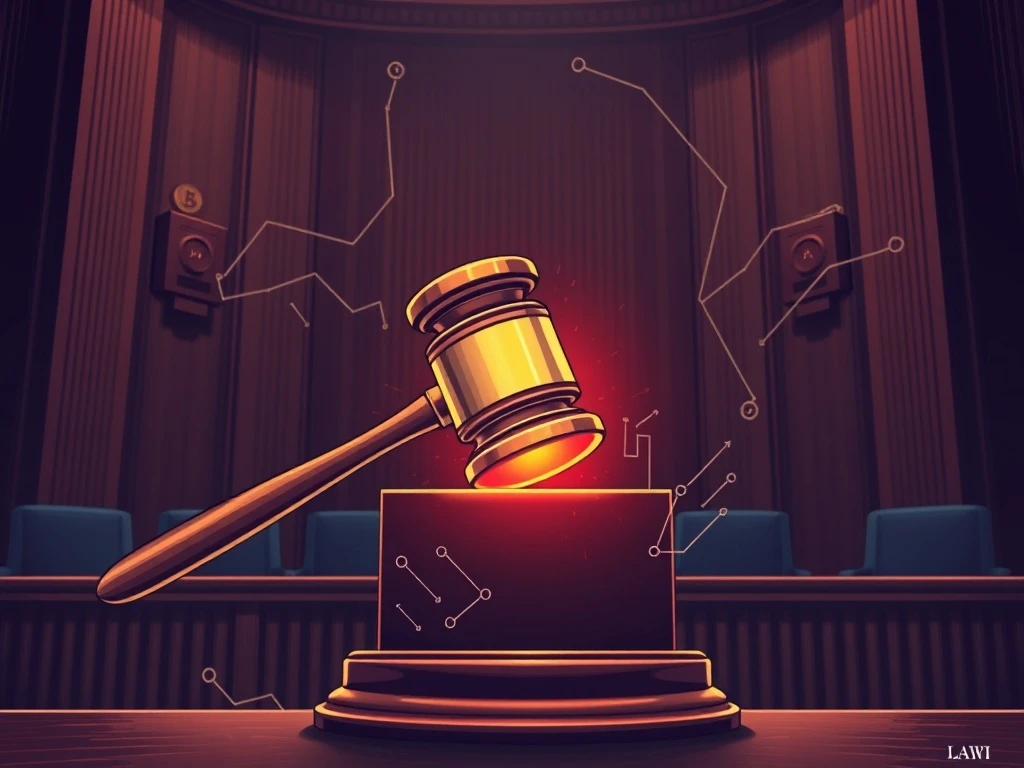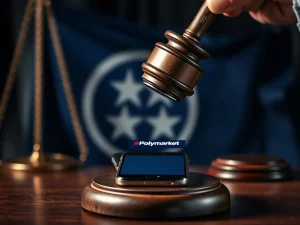Crucial Roman Storm Verdict: DOJ May Pursue More Charges

The **Roman Storm** trial verdict has sent ripples through the cryptocurrency community. Many observers closely watched the proceedings. The US Department of Justice (DOJ) could still pursue serious charges against the **Tornado Cash** developer. This outcome leaves the door open for retrial on crucial counts.
Uncertain Future for Roman Storm and Tornado Cash
A recent jury verdict created an uncertain future for **Roman Storm**, a key developer behind **Tornado Cash**. On Wednesday, the jury convicted Storm on one felony count. This charge involved conspiracy to operate an unlicensed money transmitting business. However, jurors did not reach a unanimous decision on two other significant charges. These included conspiracy to commit **money laundering** and conspiracy to violate North Korea sanctions. This partial verdict means the US government retains the option to retry Storm on these unresolved counts.
Jake Chervinsky, chief legal officer at Variant Fund, highlighted this possibility. He stated on X that the **DOJ** will decide soon whether to pursue a new trial. This decision carries immense weight for the entire decentralized finance (DeFi) sector. The crypto industry and privacy advocates have watched the case intently. They understand its potential for lasting implications.
DOJ Charges and the Hung Jury’s Impact
The initial **DOJ charges** against **Roman Storm** were severe. Prosecutors accused him of facilitating extensive illicit financial activities through Tornado Cash. Specifically, the government claimed the protocol helped launder over $7 billion in crypto between 2019 and 2022. A significant portion of these funds allegedly belonged to North Korean state-sanctioned hackers. These hackers reportedly laundered stolen funds through the mixer.
Despite the conviction on the unlicensed money transmitting charge, the hung jury on **money laundering** and sanctions violations provides a complex outcome. This indicates that jurors could not unanimously agree on Storm’s direct intent or involvement in these specific illicit activities. Consequently, the **DOJ charges** remain partially unresolved. The government now faces a strategic decision. It must weigh the likelihood of securing a full conviction in a subsequent trial against the resources required.
Broader DeFi Legal Implications and Industry Concerns
The **Roman Storm** case extends far beyond one individual. It establishes critical **DeFi legal implications** for decentralized protocols. Attorney Aaron Brogan emphasized this point to Crypto News Insights. He noted that the broad application of federal money transmitter law worries many in DeFi. They fear similar charges could apply to their own decentralized applications. While the government may not target every DeFi project, this broad exposure gives them significant leverage in negotiations.
Jake Chervinsky described the partial verdict as “a sad day for DeFi.” He warned that Section 1960 under the US Code poses an existential threat. Prosecutors used this section to charge Storm with operating an unlicensed money transmitting business. This legal precedent could significantly impact how decentralized applications operate in the United States.
The verdict’s impact resonates widely:
- Regulatory Uncertainty: DeFi projects face increased scrutiny regarding their compliance with existing financial laws.
- Developer Risk: Open-source software developers, especially those creating privacy tools, might face personal legal liability.
- Negotiation Leverage: The government gains a powerful tool for negotiating with decentralized projects.
- Innovation Concerns: The threat of broad application of old laws could stifle innovation in the DeFi space.
This case highlights the ongoing tension between technological advancement and traditional regulatory frameworks.
Attorneys React to the Verdict and Future Outlook for Money Laundering Charges
Legal experts have offered diverse reactions to the partial verdict. The possibility of the US bringing **Roman Storm** back to court for the unresolved charges remains. This decision hinges on factors like the strength of the evidence and the political climate. Jake Chervinsky suggested that if the Trump administration genuinely aims for the USA to become the crypto capital, the DOJ should not retry the deadlocked charges. This perspective highlights the political dimensions influencing legal outcomes in the crypto space.
Zack Shapiro, another attorney, shared his thoughts on X. He concluded that the situation leads to a “pretty depressing conclusion” for the industry. However, he noted one positive aspect. The “draconian” prison sentences associated with the **money laundering** charges are off the table for now. This temporary relief offers some comfort amidst the ongoing legal battles. The government might indeed choose not to retry the mistried counts of **money laundering**, especially given the political posturing around cryptocurrency.
Historical Context: Tornado Cash Sanctions
The legal battle surrounding **Tornado Cash** has a history. In 2022, the US Office of Foreign Assets Control (OFAC) imposed sanctions on the crypto mixing service. OFAC accused Tornado Cash of facilitating **money laundering** activities. This move sparked significant debate within the crypto community. Many viewed it as an overreach, targeting a neutral technology rather than specific bad actors.
However, a US court overturned these sanctions in January 2025. This decision marked a major legal victory for decentralized crypto and privacy-preserving protocols. It challenged the government’s authority to sanction open-source software. Despite this, the current **DOJ charges** against **Roman Storm** indicate the government’s continued pursuit of accountability for perceived illicit financial flows through such services. The ongoing legal scrutiny underscores the complex interplay between innovation, privacy, and regulatory oversight in the digital asset space.
Conclusion: A Critical Precedent for Digital Privacy and DeFi
The **Roman Storm** trial sets a critical precedent for digital privacy and the future of decentralized finance. The verdict, though partial, sends a clear message. Developers of privacy-enhancing tools could face severe legal consequences. The unresolved **DOJ charges** for **money laundering** and sanctions violations leave the crypto community in suspense. The ultimate decision on a retrial will profoundly influence the regulatory landscape. It will shape how open-source software development and privacy protocols evolve in the United States. This case remains a focal point for all stakeholders invested in the crypto industry’s future.









